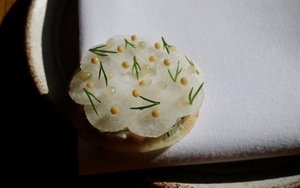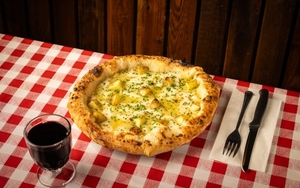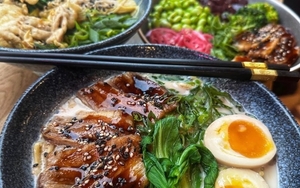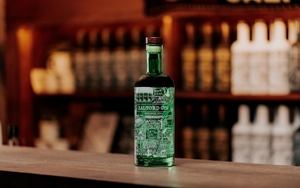A love letter to five songs for a quid
15 minute read
Whilst Manchester’s restaurants are awash with January half price offers, there’s a deal on in the pubs that has been going for decades.
For just one English pound, you can choose 5 songs to be played aloud in the pub. The deal is only available in certain pubs and prices may vary. The product also varies from pub to pub but there lies the beauty. In a world where music has become a disposable commodity - available everywhere for free at all times and algorithmically curated - five songs for a quid, the albums chosen by somebody else, is a wonderful thing.
I have a group of mates that personify this whenever they are in a pub together.
A textbook entrance every time, they work as a pack. Into the pub they go. One peels off to the bar to get the round and emergency change whilst another secures the table. The rest flock to one place: the jukebox. Fanned around in a polite arc, enough space for everyone to see the selection, one will work the buttons whilst the rest pat themselves down for a coin to unlock the first five songs.
Always democratic. A few songs each. No pressure. I’ve seen them feed ten or twenty quid in before, engrossed in the flipbook of music in front of them.
Once done, they go back to the table and bask in their choices. Every now and again fellow punters will commend them on their picks, the song selector sitting there making eyes, chest puffed out, that was me that was, like they’ve just headlined Glastonbury. If there’s a queue on the jukebox that’s fine, they’ll wait. Get the rounds in. They’re not leaving until they’ve heard their songs.
My mates thrive in Manchester because Manchester is a city of jukeboxes.
The Castle, Gullivers and Kings Arms
Whisper into the dark Manchester night, The Castle Hotel, and the wind will whisper back to you, great jukebox in there. It’s 3pm on a Monday in The Castle and two blokes are sat by the bar discussing Nadhim Zahawi’s taxes as Kendrick Lamar - “Compton” plays in the background.
The music is coming from a freestanding jukebox in the corner which carries a certain presence. The bartender, like all of the people I speak to, says that the jukebox has been there for as long as he’s worked here, and then some. I ask him what he knows about it and he tells me it’s from the 80s, it uses CDs and that it’s very popular. An integral part of the pub’s identity.
The CD detail is part of its charm. He tells me how the digital versions, which are in pubs across the city, don’t carry the same “romance.” Every now and then the staff change the albums inside but some will have been in there from the start. When I ask what’s the most popular album on there he tells me it’s easier to categorise selections by the drinker of the day.
Thursdays are dictated by students, so contemporary tunes are more likely to get a run out. Fontaines D.C. might get a few spins. Sundays meanwhile are for Mancs, that’s when New Order and Joy Division get the plays. On Saturday, The Castle plays ABBA. If you like pop music and you’ve got a spare pound coin, head over.
The jukebox in Gullivers over the road is called ‘Ultimate’ and sits on a far wall facing the front door. Molly, who works on the bar tells me that whilst the Castle over the road has a pop-heavy jukebox, at Gullivers there’s more hip hop and heavy metal. Scrolling through, there’s some Turnstile and Sam Fender as well as Drenge.
Mollie tells me that they briefly experimented with ambient music, “but what works in your spare time can really bomb at work.” The albums are changed regularly and six to eight will be switched out at a time, with staff deciding on the selection. She cites the search as part of the appeal. Clicking through the buttons, getting a feel for what sort of place you’re in.
She says the pub made the mistake of putting Robbie Williams’ 1997 debut album Life Through A Lens on recently. The weekend onslaught of “Angels” has made its inclusion untenable. Robbie is set for the chop. Molly says there’s a regular group that come in on their way out of Piccadilly Records on weekends. They’ll sit at a booth near the jukebox and compare their vinyl purchases, reading through sleeve notes and admiring jackets.
These people will have just spent in upwards of £40 on physical music and they will still feed coins into the jukebox.
Contrary to belief, the jukebox in the Kings Arms in Salford has only fallen off the wall once. The resultant unit is a piece of Frankensteinean beauty. The parts of three separate jukeboxes rolled into one majestic machine. Choosing a song in the Kings Arms comes with a unique pressure. The only pub in the world where your selection is judged by a large black and white cat called Charlie.
‘Tradition’ as this one is called, is as aesthetically pleasing as they come. A faux stained glass front and a heft that lends itself to falling off walls. On a Tuesday afternoon at around 3pm, it’s just me, the barman and Charlie as the sound of Diana Ross softly fills the room. The silence between each song punctuated by the internet modem-esque click clack of the CD changing.
Each time I flick through a jukebox I think it’s my favourite. This one is my new favourite. The first Mac Demarco album, Beyonce’s Lemonade and The Pharcyde’s Bizarre Ride II cap off an eclectic mix that also includes Adam Ant, The Best of De La Soul and the Twin Peaks soundtrack by Angelo Badalamenti. I feel Charlie’s glare burning into the back of my head as I peruse.
The barman tells me he can walk in for his shift and know who is in by what is playing. The selection here is a joint effort between staff and punters, with the latter bringing CDs for consideration. I ask the barman what his favourite album to listen to is.
“I know it sounds silly, and I’ve obviously heard Nina Simone before,” he says. “But I didn’t understand Nina Simone until I started working here.”
Another member of staff says that she’d never put her favourites on in fear of listening fatigue. I ask where they got their jukebox from and Gullivers, The Castle and Kings Arms all say the same thing:
Masons.
Audio avengers on an industrial estate in Ardwick
“The main thing with those jukeboxes is they need to be curated. They need somebody to put a stamp on it and what they want it to represent,” Jack Jennings of Masons Sound says.
If a pub in Manchester has a CD jukebox, chances are it’s been leased by Masons. Beginning life as a jukebox installation company in the 80s, the company’s motto of “have a go at anything” soon led them into pinball machines and video games before expanding into venue sound and AV systems.
Whilst a majestic ’56 Seeburg freestanding vinyl jukebox in the corner of the office is a celebration of the company’s early days, these days it’s all about modern technology. CDs that is. Masons lease and service digital jukeboxes too, but they don’t quite hit the same.
“There’s plenty of digital jukeboxes out there, that you can pull up any track under the sun on,” Jack says. “That’s all great and everything if you know what you’re looking for, but it doesn’t give a venue a specific vibe. The thing with those CD jukeboxes is you can create your own little atmosphere. Every one is different.”
“You know when you go into that venue you’ll get a certain style. That can really set a venue apart. We’ve found the value of the jukebox these days, especially with the CD ones, is having a venue that has an identity and knows what it wants to do.”
The value of music is a theme that regularly punctuates conversations about jukeboxes. “It’s unbelievable now, how easy music comes to everywhere all the time,” Masons founder Phil Mason says. “Contrast to how difficult it was, listening to Radio Luxembourg late at night hoping they would play one of the records you liked.”
There’s no favourites at Mason’s. Phil says that he likes what all of the jukeboxes do, bonus points if they don’t break. The two joke that there’s a certain rough pub in Wigan that can be a bit of a nuisance for callouts, but all of the CD jukeboxes they lease have been absorbed into their surroundings and are unique. “I’ve always had a soft spot for the jukebox in a room on its own,” Phil says.
“There’s one in Trof NQ and there’s one upstairs in The Castle, where people in the room will bond around the jukebox, they might not know each other when they start but after an evening discussing which tracks to put on next, it brings the room together.”
Fun fact: the jukebox in Coronation Street’s Rovers Return Inn is one of Masons’.
It’s defunct but it’s there. As was the one in the Haçienda, which they say was “an absolute disaster.” In the past they’ve leased out jukeboxes to Co-op Funeral Conventions. Obscure choir music and Louis Armstrong - “What a wonderful world” on repeat.
They also supplied one for The Jockey in Shameless and one on the top floor of the People’s History Museum. The latter is a beauty. A proper Wurlitzer, bright lights and the tubing where a bubble goes from side to side. The selection is eclectic again. When I visit to take a picture, it’s playing “Beautiful” by Christina Aguilera (sad face) and I tap in tunes by Hot Brass 8, Barry White and Astrud Gilberto.
The jukeboxes you see in the likes of Gullivers and Kings Arms are NSMs. Originally German-made in the 80s, the machines are no longer in production. “We keep them going basically. We repair the parts. We shop around to find parts that’re available. They do need a lot of attention,” Jack says.
“The CD itself now is pretty defunct. You can still keep them going in terms of the content but the equipment itself, we’ve got a workshop here, with various jukeboxes in different states and parts. If one jukebox has got an issue, we’ll put together what we can to keep it up and running for the venue. We’ll keep doing that for as long as we can keep the parts going basically.”
Whilst jukeboxes aren’t necessarily about making money, depending on their footfall, most places are thought to break even. Costs are covered with a bit of extra on the side. “A lot of the time it’s not about the financial side,” Phil says.
“When you walk into a venue and you see a jukebox, you know you’re in a certain place. It sets the tone almost. In a literal and metaphorical sense. The big floor standers like the one in The Castle, they’re lit up, they’re like a big bit of furniture. It’s like having a piano in there. Those are the crème de la crème.”
Whilst the future for jukeboxes as a whole looks digital, all touchscreens, endless music catalogues and app integration, the chaps at Masons are busy retrofitting for a cashless age. When even the bars themselves are moving away from cash, essential work is underway to add contactless payment devices to older machines in order to keep them viable.
I ask both Jack and Phil what they think is the most widespread album on Manchester jukeboxes.
Phil says The Stone Roses. Jack says the Smiths. I think it’s New Order.
Sandbar, Big Hands and The Temple
It’s just gone 3pm on a Wednesday in Sandbar, “Walking in the Rain” by Grace Jones is playing, and an elderly couple are putting drinks on a tab because there’s no change in the till for a tenner and they don’t have their bank card.
It’s fine though because they’re meeting their granddaughter here who’ll get it on Apple pay. If The Castle does pop, Gullivers does metal and hip hop and the Kings Arms a cult and contemporary mix, the Sandbar jukebox is defined by its jazz albums.
“I still hear songs that I’ve never heard before,” the barman tells me at Sandbar. “There’s less on there than a digital one but it’s a more exciting experience.”
Ethiopian jazz is a standout on Sandbar’s machine, contrasted with Against Me albums, a John Peel sessions album and local favourite Lonelady. The barman recommends Jaya The Cat, an artist that was new to him but is now one of his favourites. There’s also some Whitney Houston and Sun Ra.
A stone’s throw away, Big Hands sits on the very edge of my jukebox bar crawl. As students are ID’d for drinks and Jazz the manager pours away the liquid on the cabbage she’s dry-brining before pickling, she gives a play by play of how young people interact with the jukebox.
Many will politely come up to the bar and ask how to put a song on, “wowed” as Jazz puts it, when buttons result in mechanical movements and songs coming on as a result. “It’s a real trip for young people,” Jazz adds.
Jazz tells me about a time when a student came to the bar and politely asked to be shown how to use the jukebox. Jazz happily obliged and after much perusing, the student returned to the bar, albeit with a problem.
“The song that I want isn’t on there,” the student said.
Some of Jazz’s best memories involve the Big Hands jukebox but there’s also a bittersweet story behind it. Eight days before the death of Manchester music legend and Big Hands and Temple owner Scott Alexander, Big Hands was broken into.
The safe was drilled, spirits and the inside of the till robbed, but most tragically, the original jukebox was stolen. Scott’s personal music collection. To lose Scott and his music collection days apart was devastating.
Despite searching far and wide the jukebox couldn’t be found. “We would’ve paid to get it back,” Jazz says. “It was priceless.”
Both the Big Hands and The Temple jukeboxes reflect Scott’s musical affiliations. The two mix the likes of Scott’s band Indigo Jones as well as local affiliates Elbow, I Am Kloot and Badly Drawn Boy with albums by Nick Cave, The Beta Band, At The Drive-In and Smashing Pumpkins, (Big Hands) and a lot of Tom Waits (Temple).
Jazz says that a bloke came up to the bar in Big Hands recently complaining that they’d been playing non-stop Beastie Boys. “It’s called an album, mate,” She jokes.
Over at The Temple, barman Connah describes the bar as the “perfect” place to listen to music on a dark, rainy day.
“It’s the right environment and atmosphere. It changes everything,” he says, as he explains how the jukebox in the bar has transformed the way he listens to music, giving him a newfound appreciation of Tom Waits. When it’s time to dance, on comes ACDC.
Bar Fringe
It’s 10.15pm on a Wednesday night in Fringe Bar and an elderly man with underpants, cheese, white and black pudding and sausages in his backpack, all bought from Bury Market that day, is telling me a story about koi carp in Newark.
The koi carp turn out to be a minor detail in a story that culminates in him visiting a house that had its own top-of-the-range 50s vinyl jukebox. “The colour,” he says, emphasising its extravagance.
Holly who works on the bar tells me she doesn’t know much about the jukebox in Fringe, but she’s led to believe that there’s a secret combination that plays “Toxic” by Britney Spears. The sassy equivalent of ordering off-menu. The Fringe karaoke machine is an intriguing wooden cabinet complete with small figurines below the music choices. Above it, a sign reads ‘Vodka… cheaper than botox.’
The Fringe karaoke machine is big on compilations. A compilation for any occasion, be it genre or era defined. A pop-punk selection sets it apart, as does its aesthetic which brings to mind those Greek roadside shrine boxes (iconostases) if they were in your British nan’s house.
Holly is apologetic for not knowing more about the jukebox, but there’s a silver lining. The song playing on the iPad is one that she first came across in Fringe on the jukebox.
The Song? “Whippin’ Piccadilly” by Gomez. Fitting.
Corbieres
The first ever song played on a jukebox in Corbieres was “The Whole of the Moon” by The Waterboys. The barman, Kyle, tells me.
He says it’s by far the most played. On weekends, the song is guaranteed to be one of any punter's five chosen songs for a quid. That’s a lot of moon for the staff, who at this point manage to mentally filter it out.
The Corbieres jukebox has a mythical status. Talk of “award-winning” and “best” swirls every time you mention it. Sometimes when the staff look over, they will see someone holding a drink close to it, poised to put the drink on top when selecting a song. The staff, in a state of pure adrenaline-fuelled fight or flight mode stand poised in these situations, ready to physically jump over the bar to avoid any potential spillage disasters.
They’re protective over the jukebox and rightly so.
The Corbieres jukebox is feted for good reason. The selection is strong. The Kinks, The Small Faces, Boys & Girls by The Alabama Shakes, Once In A Lifetime by Talking Heads and of course, the world-famous Corbieres staff mix. A mix that currently boasts Lauryn Hill, The Durutti Column, Rush, The Black Keys and Bonobo.
The last time I was in, Wet Leg were on with “Chaise Longue”. Now the Big D has graduated to album status.
“We used to have more regular staff mixes but the girl that burned them to CD left,” Kyle says. Sadly nobody else has a laptop with a CD drive, but there’s hope on the horizon. They’re working on it.
Kyle says people always like to ask about the queue on the jukebox, but the staff have no way of knowing how long before your song will come on. Not to sound like Brian Potter, but a jukebox queue keeps them drinking. Kyle tells me the contemporary stuff is easier to switch in and out when it comes to changing the albums. Under no circumstances would they put Oasis on. They’d never get it off.
As I’m getting ready to leave, Kyle catches me. There’s been a mistake. Whilst ‘Whole of the Moon’ may well be popular, it wasn’t the first. “My manager has just text me. It wasn’t The Waterboys,” he says.
The first song to be played on a jukebox in Corbieres was “Each and Every One” by Everything But The Girl.
Follow Davey on Twitter and Instagram: @dbretteats












